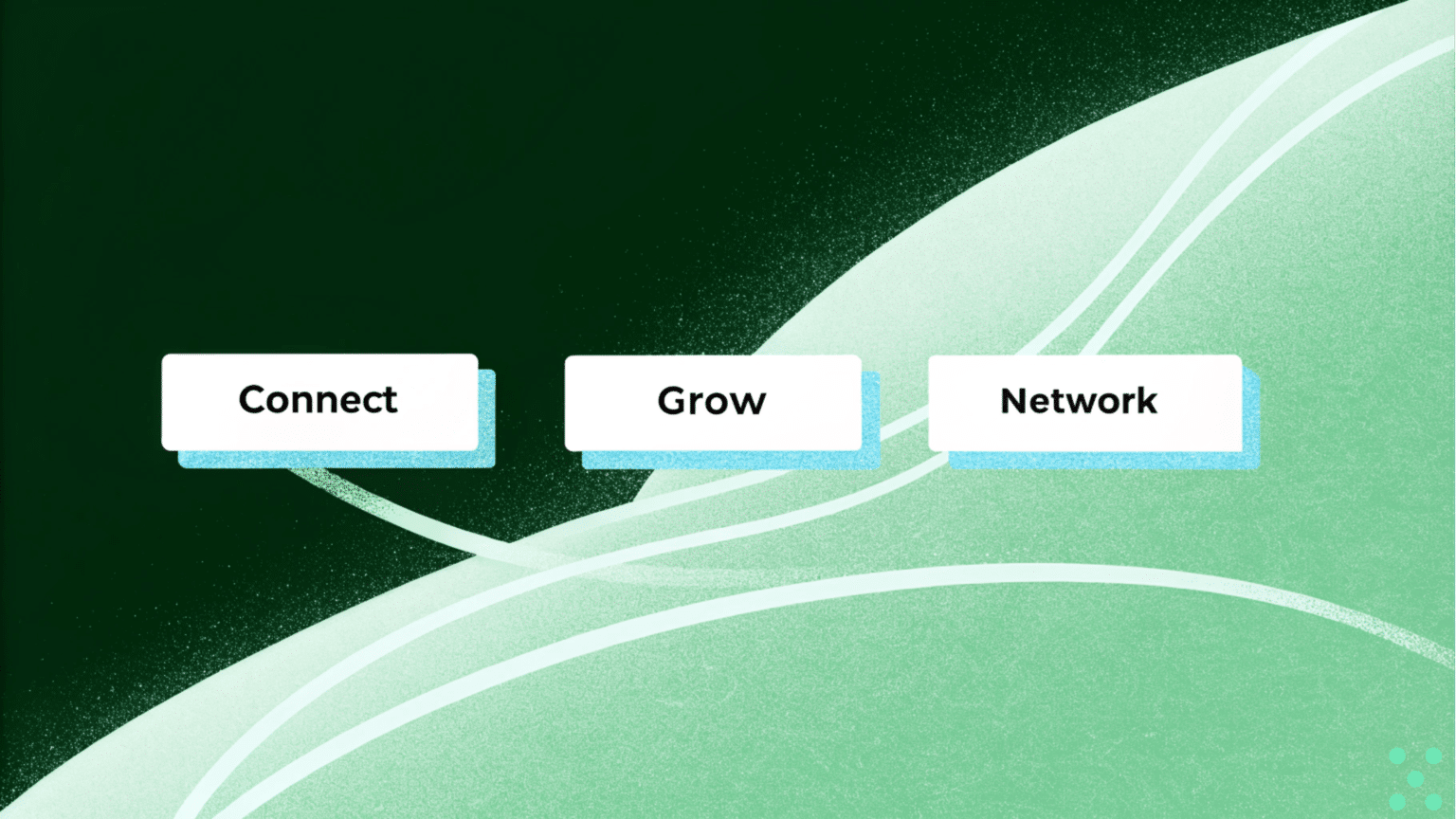Not every brand can afford to hire a digital marketing strategist on board to help them plan marketing campaigns.
Especially when you’re operating in a small team, or a 1-person marketing operation, creating marketing strategies and campaigns for all marketing channels can be time-consuming and hard.
In this guide, I’ll walk you through how to create a generalist marketing strategy for your brand using generative AI tools, and then dive deeper into generating a strategy for the different channels.
Before we begin, let’s go over how AI is being used in marketing strategy:
How is AI Being Used in Marketing Strategy Planning
There are different ways of implementing AI into your marketing strategy, such as automating repetitive tasks, making decisions and predictions, and personalizing your content to your customers.
AI can also be used in creating your marketing strategy by building out a marketing plan to save you time and strategize on your behalf.
A digital marketing strategist would usually take into consideration the following considerations:
- The industry you are in.
- Your product and how it solves customers’ problems.
- Your target audience.
- Your desired growth channels (or come up with the growth channels).
- Your current marketing budget.
All of this is information that can be fed into a generative AI platform to provide you with a tailored marketing strategy.
💡 Even though artificial intelligence cannot produce a marketing strategy that is as refined as the ones from experts and consultants, it can serve as a starting point and a major time-saver.
6 AI Use Cases For Generating Marketing Strategies
In this section, I’ll go over the 6 main use cases of AI for generating marketing strategies, covering the different marketing channels.
#1: Generating A Generalist Marketing Strategy
Similar to a digital marketing strategist, artificial intelligence would require plenty of context about your company to generate a tailored strategy.
For this marketing strategy generation, I’ll be using Team-GPT (our tool) which lets you use different AI models alongside your team, such as ChatGPT, Perplexity, and Claude.
➡️ Even though it’s possible to train Team-GPT on your company’s information, for the sake of this article I’ll be manually inserting our organization’s context so you can use my prompts.
You can use my prompt template:
I want you to generate a digital marketing strategy for my [solution], [company name]. We operate in the [industry], and our solution lets you [use cases]. Our target audience is [target audience]. Our marketing budget is [$$$] a month. Ideally, I'd want you to recommend our growth channels and how to approach each marketing platform.
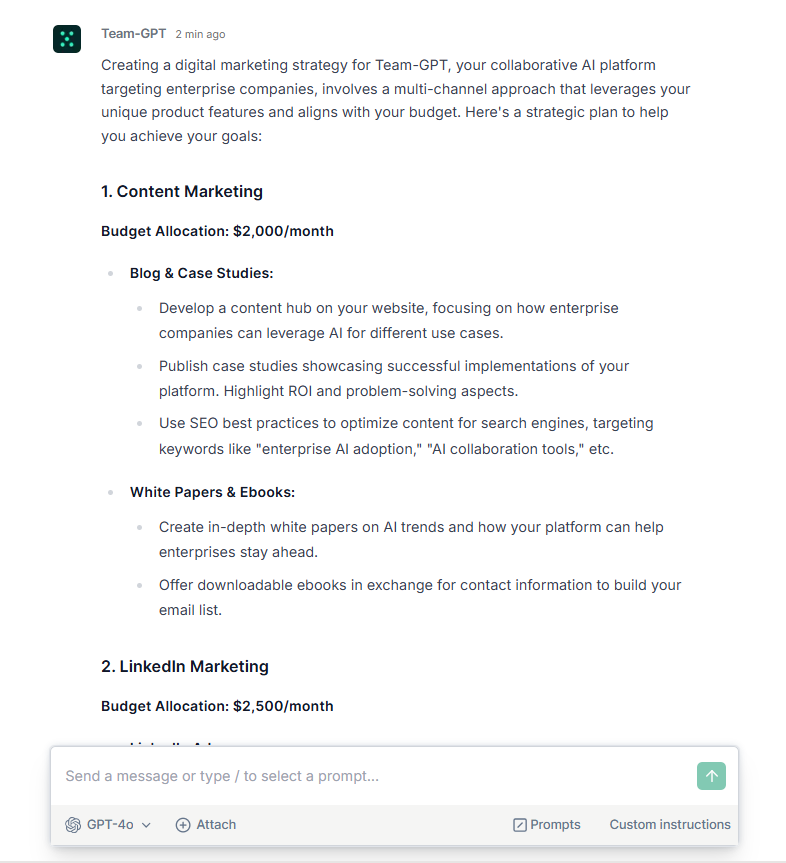
The platform recommended our AI platform, Team-GPT, to focus on the following growth channels:
- Content marketing, developing blogs, case studies, and white papers.
- LinkedIn marketing in both advertising and organic posting, since we’re trying to reach enterprise clients.
- Webinars and virtual events, where we can offer live demos of Team-GPT so prospects can see the platform in action.
- Google Ads to target high-intent keywords related to our AI platform and AI enterprise solutions.
- Other marketing channels, such as email marketing to nurture leads and strategic partnerships with AI influencers.
The platform also gave me KPIs to track, such as website traffic, conversion rate per marketing channel, cost per lead, CPA, and return on ad spend.
#2: Generating A Social Media Strategy
Now that we’ve generated our generalist marketing strategy, it’s time to dive deeper into the different marketing channels.
Here’s my next prompt for generating a social media marketing strategy:
I want you to generate a social media marketing strategy for my [solution], [company name]. We operate in the [industry], and our solution lets you [use cases]. Our target audience is [target audience]. Our marketing budget is [$$$] a month. Ideally, I'd want you to recommend organic growth channels and how to approach each marketing channel.
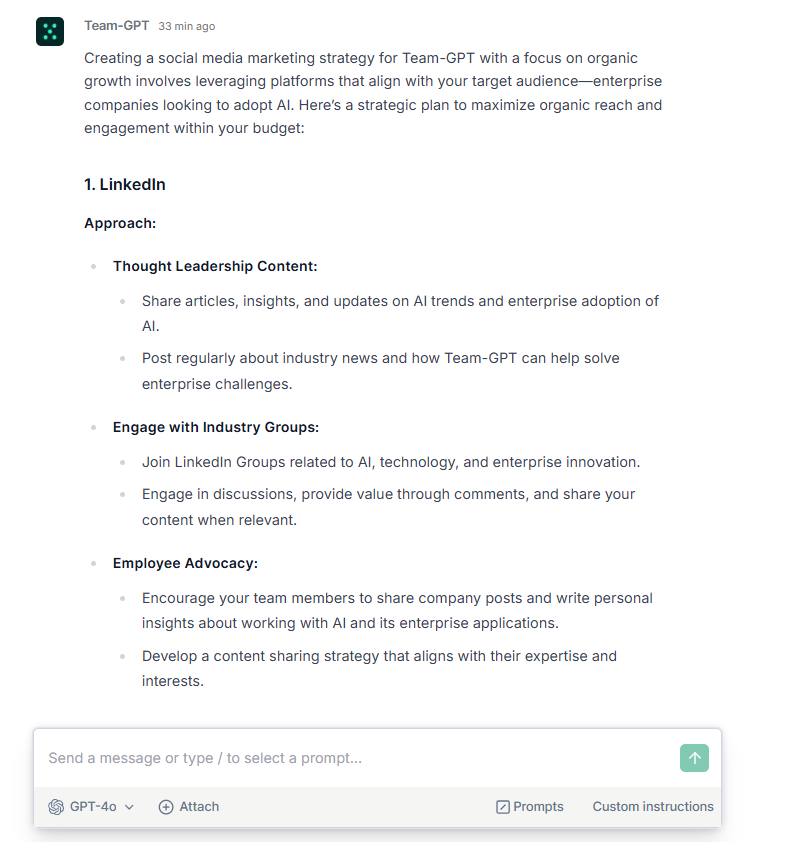
The platform used my prompted information and the insights from the generalist marketing strategy to recommend me to build a following on:
- LinkedIn, where we should share articles, and insights, and post regularly to build a following.
- Twitter, where we should tweet about AI trends, and industry events, and share infographics and short-form video content.
- YouTube, where should post educational videos around the AI industry, short-form content on how to use Team-GPT, and use case examples.
#3: Generating An SEO Strategy
The generative AI platform will have plenty of information about your brand by now, which means that we can prompt it to use the above-mentioned information.
I’ll now prompt Team-GPT with the following:
Using the above-mentioned information on the marketing strategy for Team-GPT and our target audience and product, I want you to generate an SEO strategy and dive deeper into what we should be publishing, the keywords to be going after, and how to structure our content for best results.
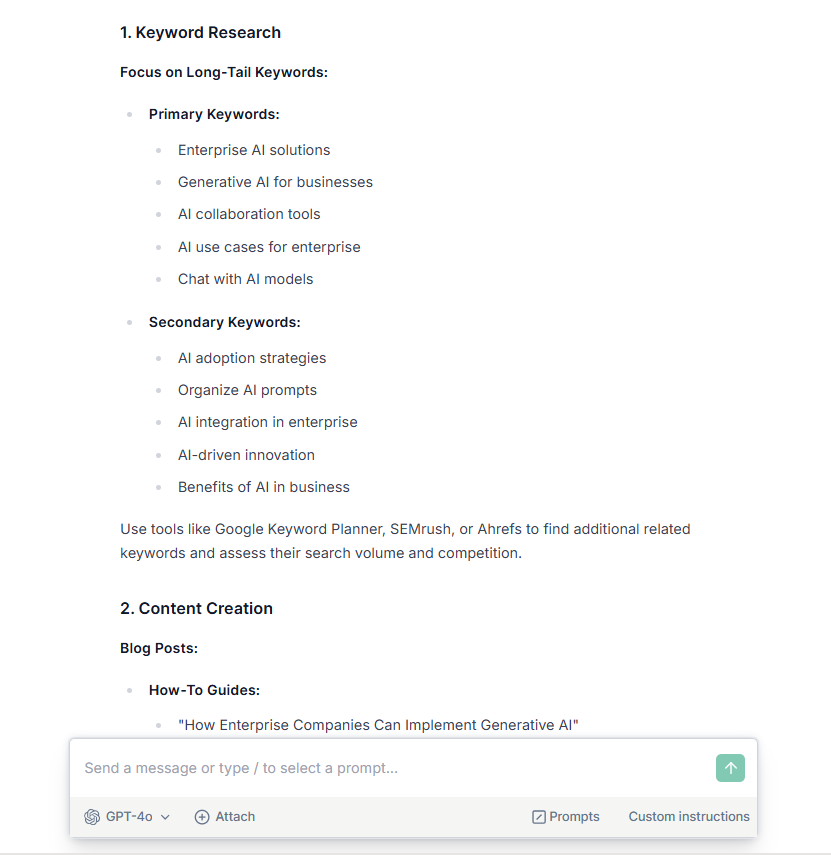
The platform generated me:
- Keywords to go after, including primary and secondary keywords.
- A content creation strategy, which includes how-to guides and industry insights to grow our organic traffic.
- A recommended content structure that includes title tags, headings, internal links, and alt text.
- Technical SEO considerations, such as site speed optimization, and mobile responsiveness.
- A link-building strategy, which includes guest blogging, partnerships, and listing our platform on online directories.
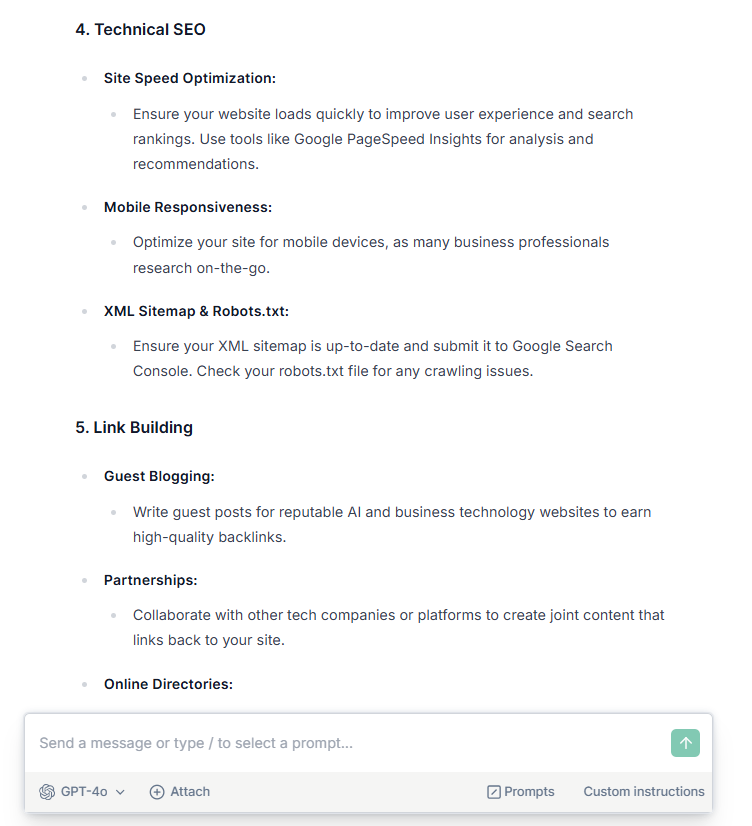
#4: Generating A PPC Strategy
The next step in our marketing strategy is to generate the PPC marketing plan.
Here’s my prompt:
Using the above-mentioned information on the marketing strategy for Team-GPT and our target audience and product, I want you to generate a PPC strategy and dive deeper into how to structure our pay-per-click campaigns, what keywords to go after, and how to approach the copy creation. Our budget is $5,000 per month for this.
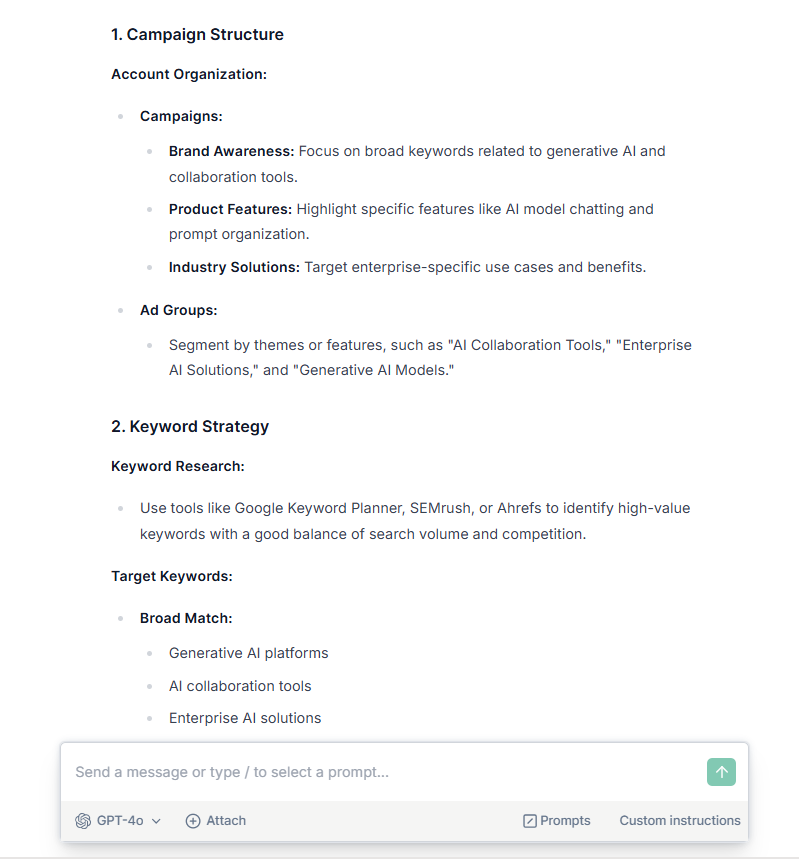
The generative AI platform was able to generate me:
- The campaign structure and ad groups, including what keywords to target.
- Example broad match, phrase match, and exact match keywords.
- Ad copy headlines, descriptions, and CTAs.
- A short guide on how to optimize our landing pages.
- KPIs to track and optimize.
- A retargeting strategy and how to segment my audience.
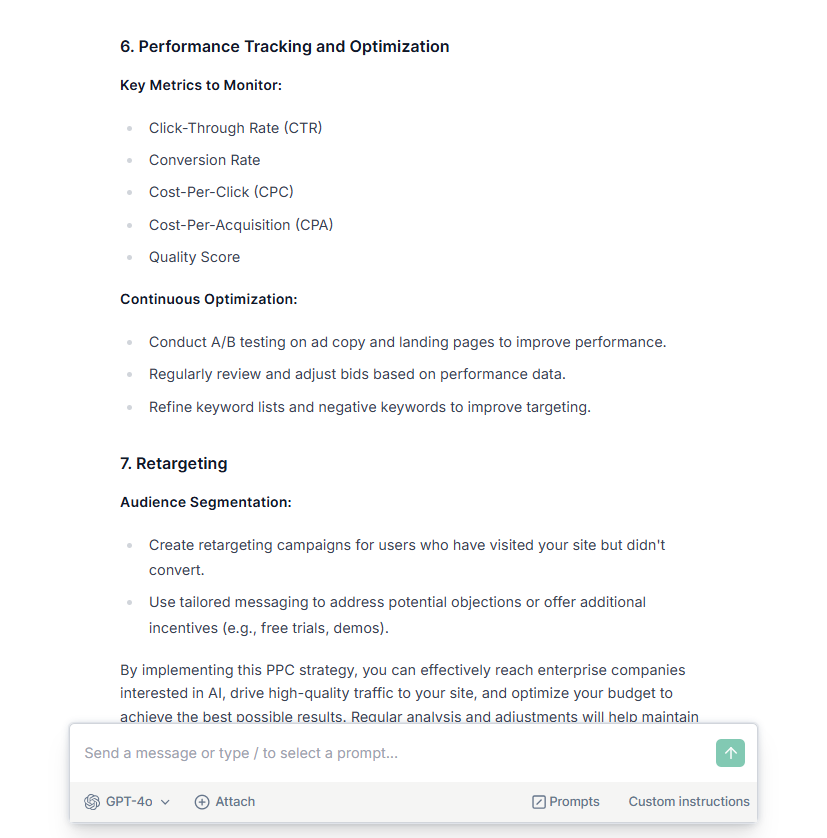
#5: Generating An Email Marketing Strategy
Next up, I’ll prompt the platform to generate an email marketing strategy to nurture the leads of our platform and build a loyal email list.
Prompt: Using the above-mentioned information on the marketing strategy for Team-GPT and our target audience and product, I want you to generate an email marketing strategy and dive deeper into how to nurture our leads with email and how to build a loyal email list.
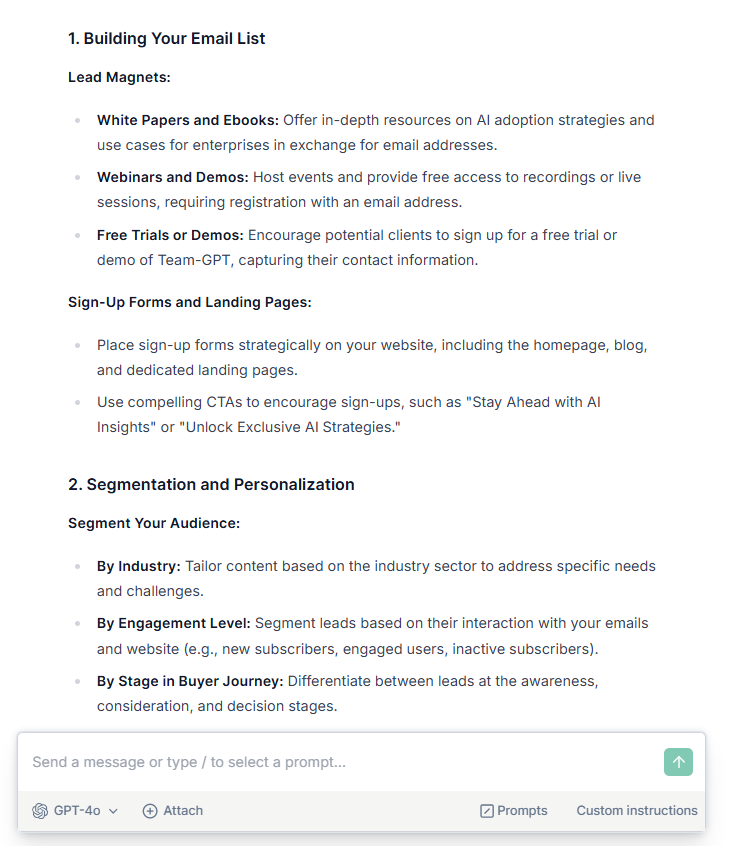
The platform gave me some pieces of email marketing advice, including:
- Building our email list with lead magnets, such as white papers and e-books on AI adoption strategies and use cases for enterprises.
- Segmenting our email list by industry, engagement level, and stage in their buying journey to improve personalization.
- Overall email content strategy, which includes newsletters, blog summaries, welcome series, and drip campaigns.
- Engagement and loyalty-building tips, such as customer success stories, and surveys to gather feedback and encourage interaction.
- KPIs to track, including open rates, CTRs, conversion rates, and unsubscribe rates.
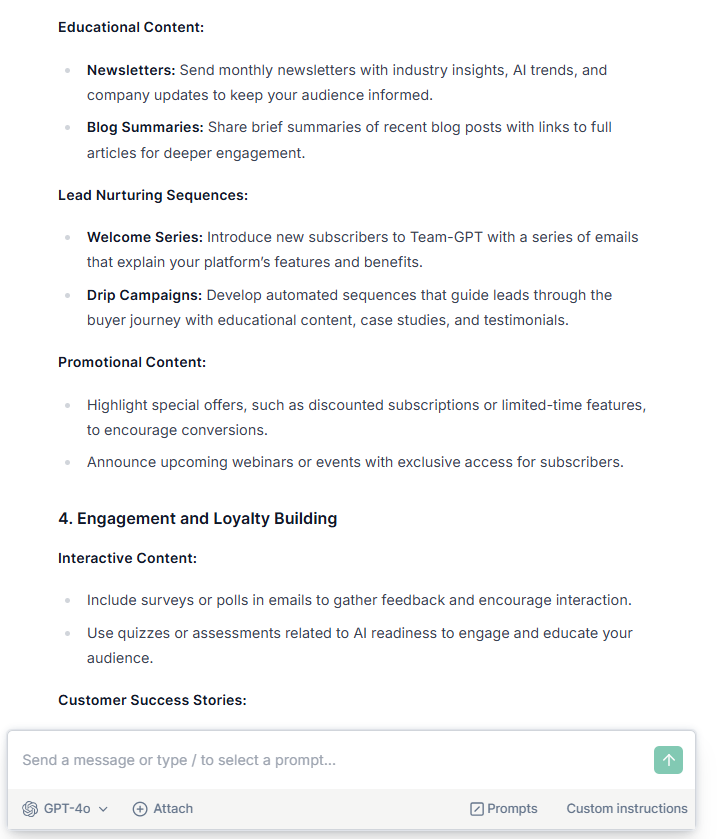
#6: Generating A Paid Social Strategy
Last but not least, I want to generate our brand a paid social strategy and to point us in the right direction in terms of what advertising channels to use and how to structure our campaigns.
Here’s the prompt:
Using the above-mentioned information on the marketing strategy for Team-GPT and our target audience and product, I want you to generate a paid social marketing strategy and dive deeper into what digital advertising platforms to use, how to structure our campaigns, and what audiences to target for maximum impact. Our budget is $5,000 per month.
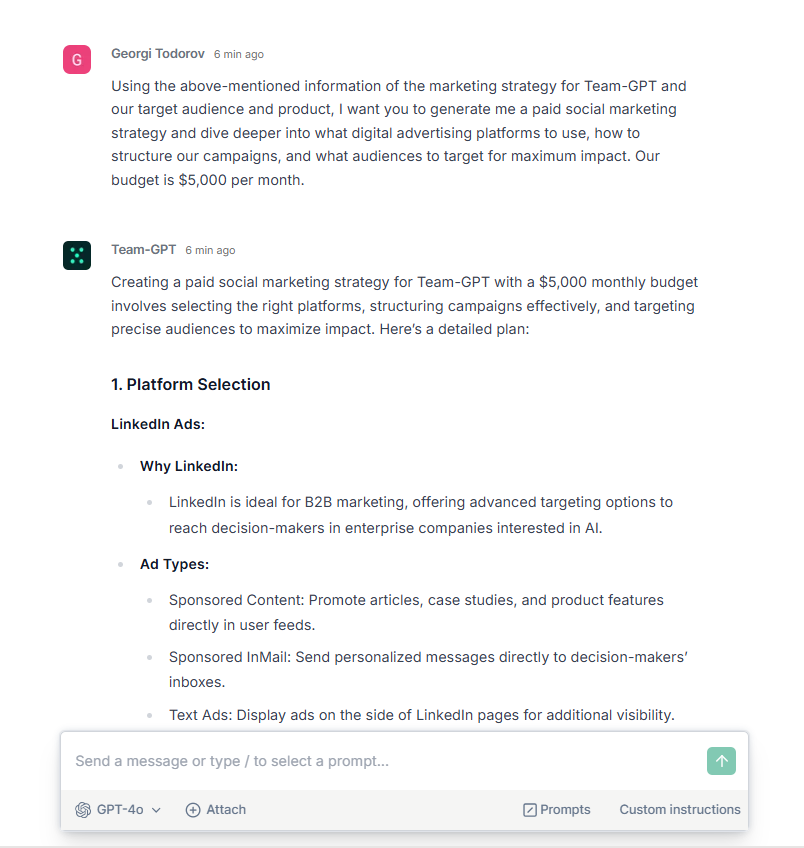
The platform was able to generate me:
- The platforms to go after, which include LinkedIn Ads, where we should do sponsored content and display ads.
- The campaign structure, building out awareness, consideration, and conversion campaigns.
- Audience targeting and demographics, including targeting by industry and using LinkedIn’s Matched Audiences to retarget website visitors.
- Ad creative and copy development strategies, that include demonstrating Team-GPT’s features and benefits.
- Tips for budget allocation and KPIs to measure, such as cost-per-lead, CTR, and conversion rate.
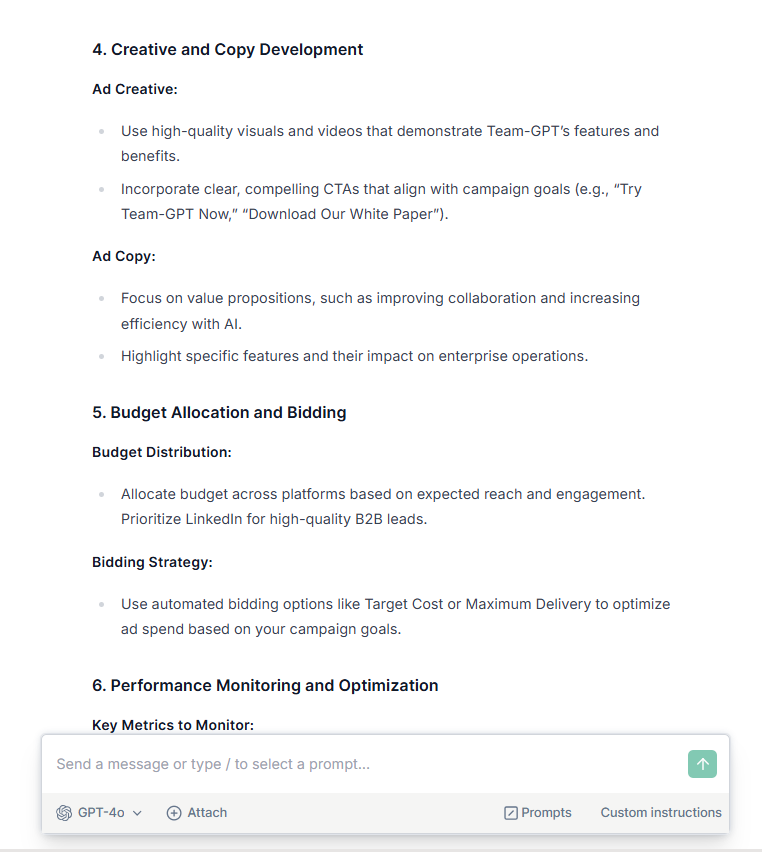
Next Steps: Generating Content For Each Channel
After you generated your marketing strategy and created a plan for each growth channel, the next step is to start generating the content.
In this section, I’ll cover how you can generate SEO content, social media posts, and emails using AI.
#1: Generating SEO Content
You can use the generative AI platforms to not only generate the SEO strategy but also execute it.
As AI technology is now capable of browsing the web to conduct in-depth topic research, and structure content in an SEO-friendly format, enterprises can use AI to write SEO-optimized articles.
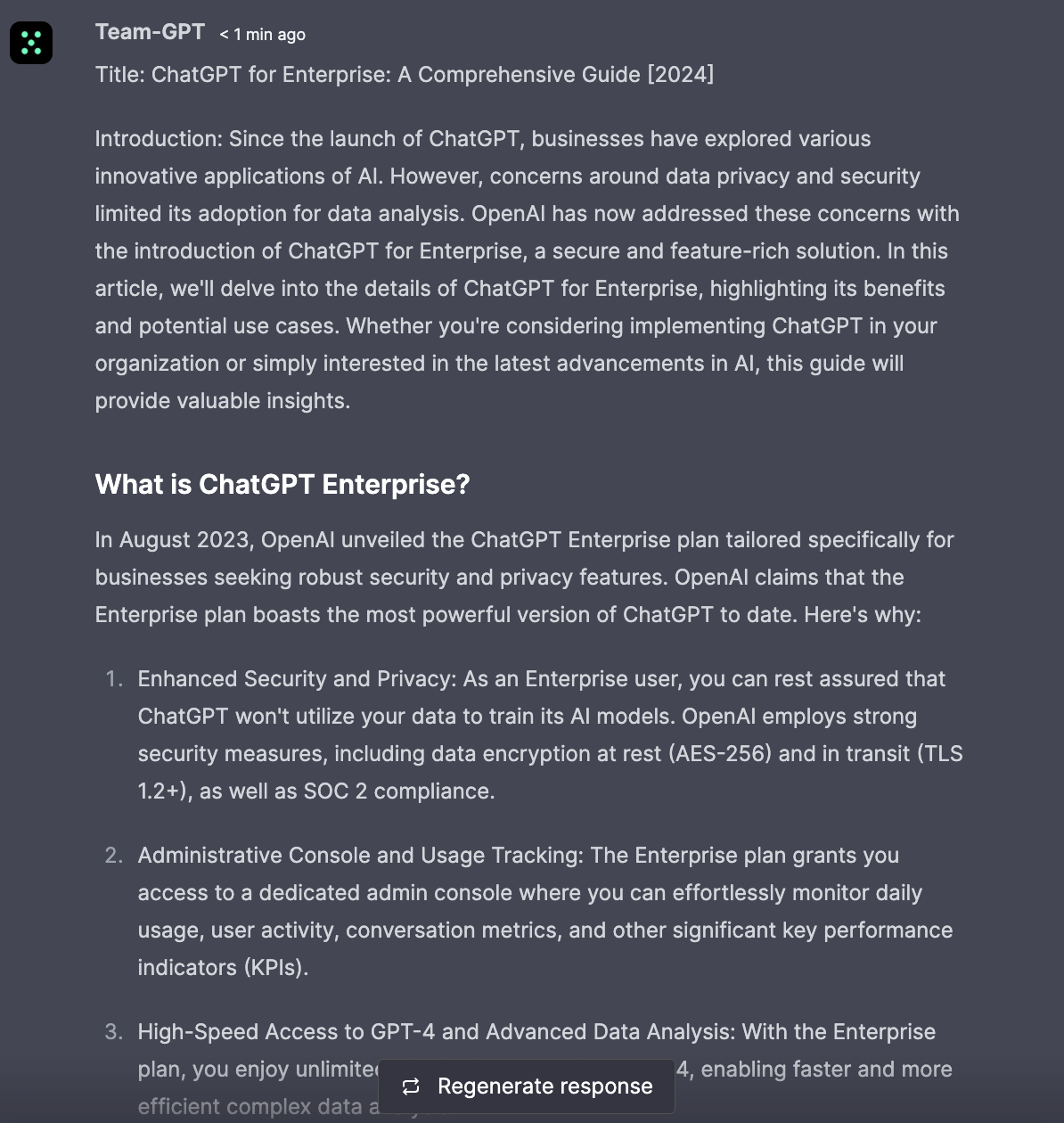
💡 Tools like Team-GPT let you further improve your content quality and humanize it by creating custom instructions for your preferred AI model (such as ChatGPT).
Here's how you can write articles in about 3 minutes inside of Team-GPT alongside your team:
Your marketing team can add instructions for brand voice, language, and writing style to make sure that you can scale your content production without having to heavily edit it.
Alternatively, platforms like Jasper AI let you access pre-made writing prompts to write optimized SEO content with integrations with SEO tools like Surfer SEO.
#2: Generating Social Media Posts
As the technology recommended our team to build a presence on LinkedIn, I’m now planning to generate some LinkedIn posts for our page.
First of all, I’d like to generate 10 more LinkedIn posts, since in our AI-generated LinkedIn strategy we only got a few suggestions.
Here’s my prompt:
Generate 10 LinkedIn post ideas around advice on how to utilize AI for digital marketing with generative AI tools.
My target audience is marketing teams at enterprises and I know that they are struggling with scaling content creation and spending much time on mundane tasks instead of focusing on the strategic aspect of digital marketing.

After that, I’ll go and then ask the platform to generate all LinkedIn posts separately and not on 1 go.
Here’s my prompt:
I want you to take into account the writing instructions provided to you and generate this LinkedIn post:
Post Title: Automate to Innovate: Scaling Content Creation with AI
I want you to start with a hook that amazes the readers with a benefit (e.g., ''Did you know that you do not have to spend hours researching for article content?) Then, limit the emoji use to 3 and make it relevant to the post.

After I receive the LinkedIn post, I remove the ‘’hook’’ and ‘’content’’ wording from the LinkedIn post and double-check if the content makes sense.
This process can then be repeated for all of the LinkedIn post ideas that the platform has recommended to us.
#3: Generating Emails
Finally, you can use artificial intelligence to generate emails based on the AI-powered email strategy that you have generated.
In this example, I’ll generate the template for the welcome series that the platform recommended us to start with.
Here’s my prompt:
Generate the template for our email marketing welcome series where we introduce Team-GPT with a series of emails that explain our platform's features and benefits.
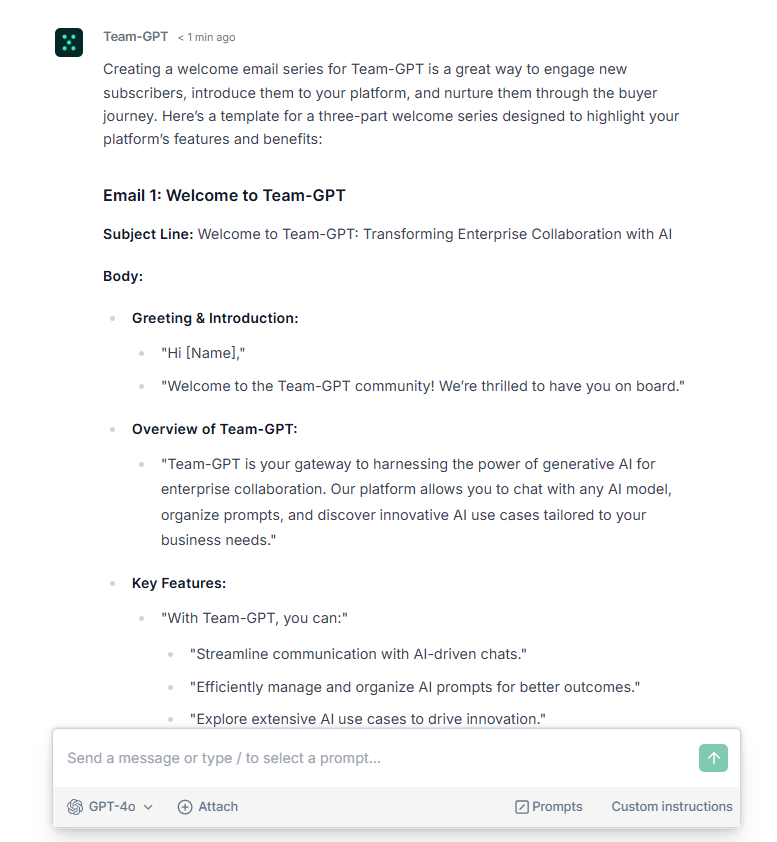
The tool generated a three-part welcome email sequence that contains:
- A welcome email that greets our new customers and provides an overview of our product and key features.
- A 2nd email that goes over the benefits of the product.
- A 3rd email that dives deeper into industry-specific use cases.
My custom version of ChatGPT on Team-GPT also generated a few additional tips, such as how to personalize the emails to our readers, how to incorporate visuals, and how to follow up after the email sequence.
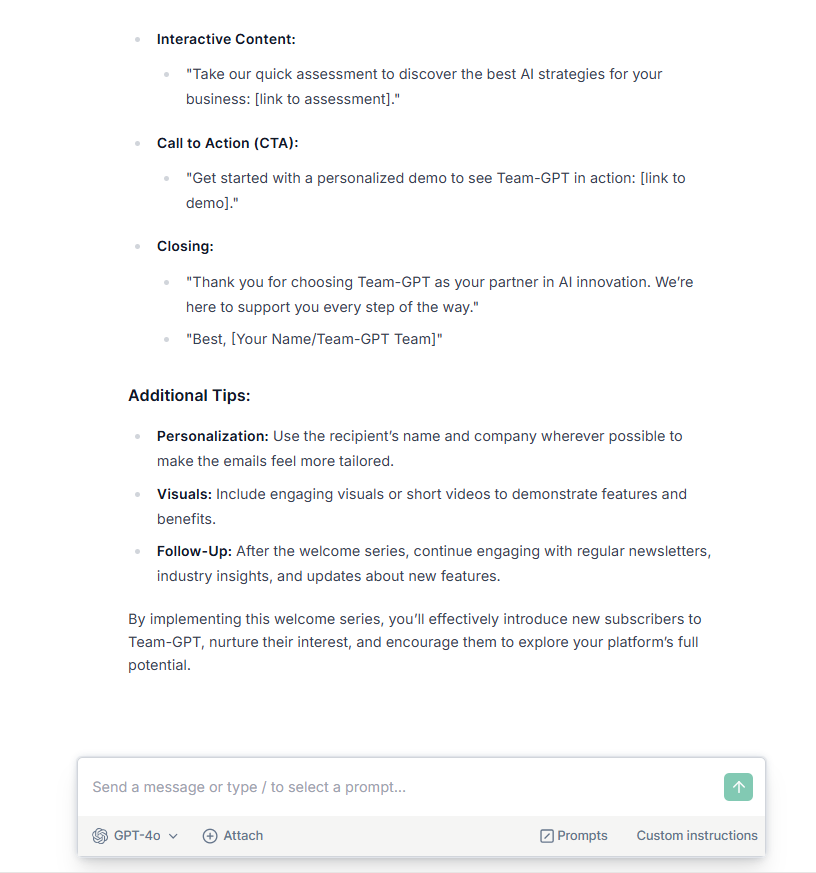
💡 Even though the platform is not as knowledgeable about our platform as I am, this template for a welcome series provides me with a good starting point that will save me time.
What Are The Best Tools For Generating Marketing Plans?
Finally, I want to introduce you to a few platforms that you can use to generate marketing plans.
To evaluate the effectiveness of each platform, I’ll prompt each one of them with the same prompt for strategy creation that I used on my version of ChatGPT.
#1: Team-GPT: Customize a Better Version of ChatGPT
You can use ChatGPT with your marketing team on Team-GPT’s platform and customize it to your needs to generate marketing plans.
After that, use your version of ChatGPT for marketing tasks, such as:
- Generating marketing strategies for the different marketing growth channels.
- Generating social media posts, captions, and copy for carousels.
- Getting social media, email, and article content ideas.
- Generating advertising copy.
- Editing and finalizing posts with Pages and Editing with AI.
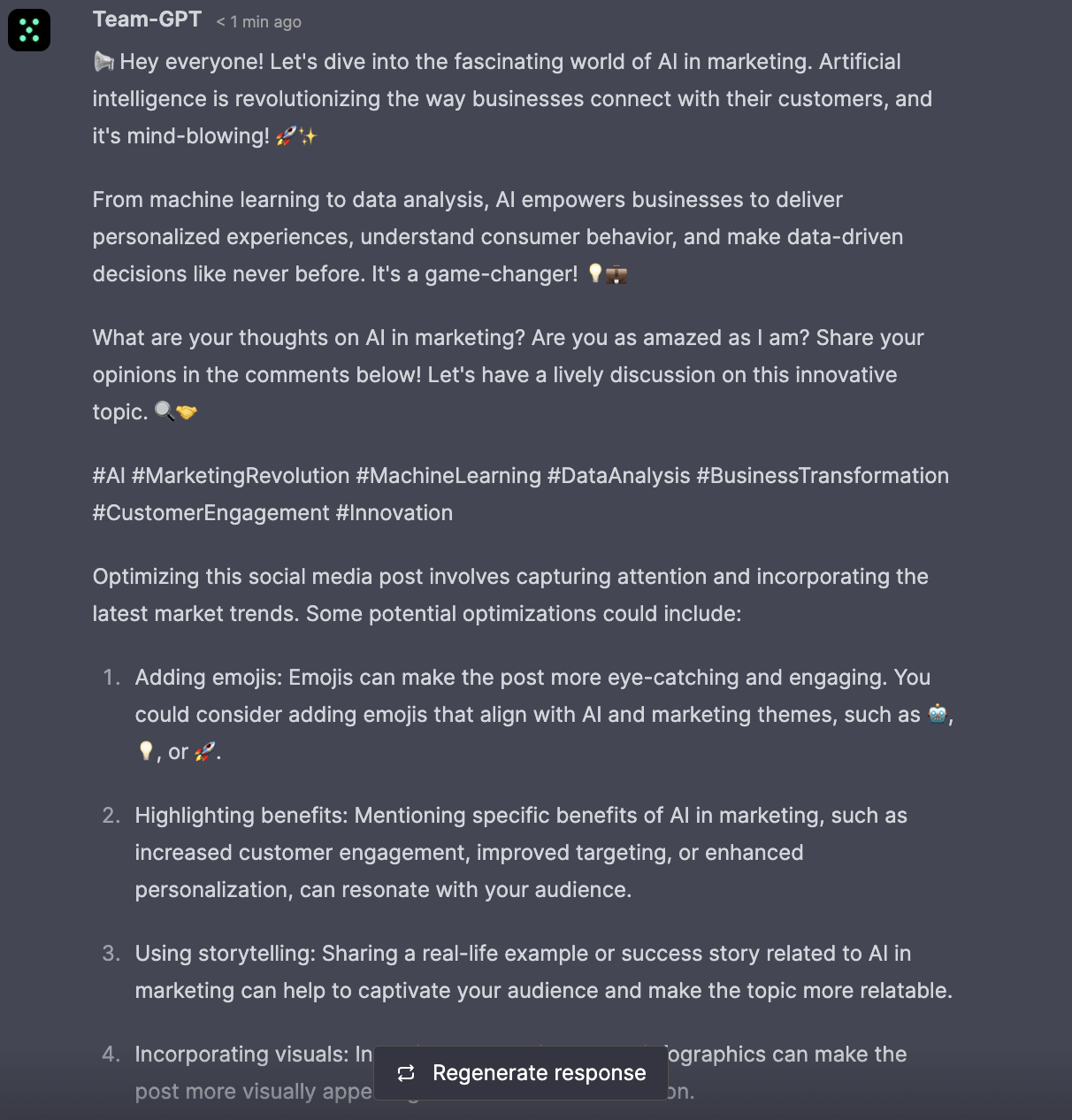
Here’s why marketers use our platform for strategy and content generation:
- Use different AI models for ideating on and generating content: You can use the basic or a customized version of ChatGPT, Claude, Perplexity, and DALL-E 3.
- A shared workspace where your marketing team can collaborate in chats and documents in real-time from a single platform.
- Smart AI-powered editing for improved writing, fixed grammar, and refined text.
- Managing your content by turning any chat into a document or starting a new conversation from a Page.
As I mentioned previously, it is possible to create custom instructions for ChatGPT so that the AI models know how to structure your marketing strategy and what content to generate.

#2: Perplexity
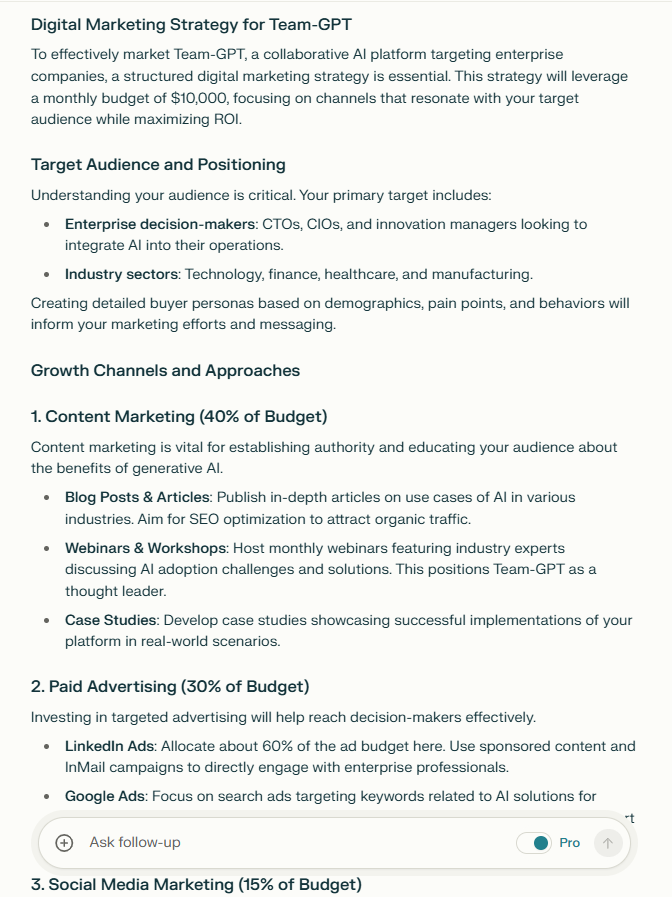
Perplexity is a good option for generating marketing plans and content for your brand.
I like the AI platform as it has above-average trainability and is good at generating article content and social media posts.
💡 It is also possible to bring Perplexity on Team-GPT and collaborate with your team on strategy and content generation together.
The advanced AI model integrates advanced search capabilities with generative AI to provide you with research-backed strategic insights.
For example, you can see in the screenshot above how the platform allocated more budget to content marketing (unlike ChatGPT) since it believed content marketing is more vital for establishing authority than strategic partnerships.
#3: Gemini From Google
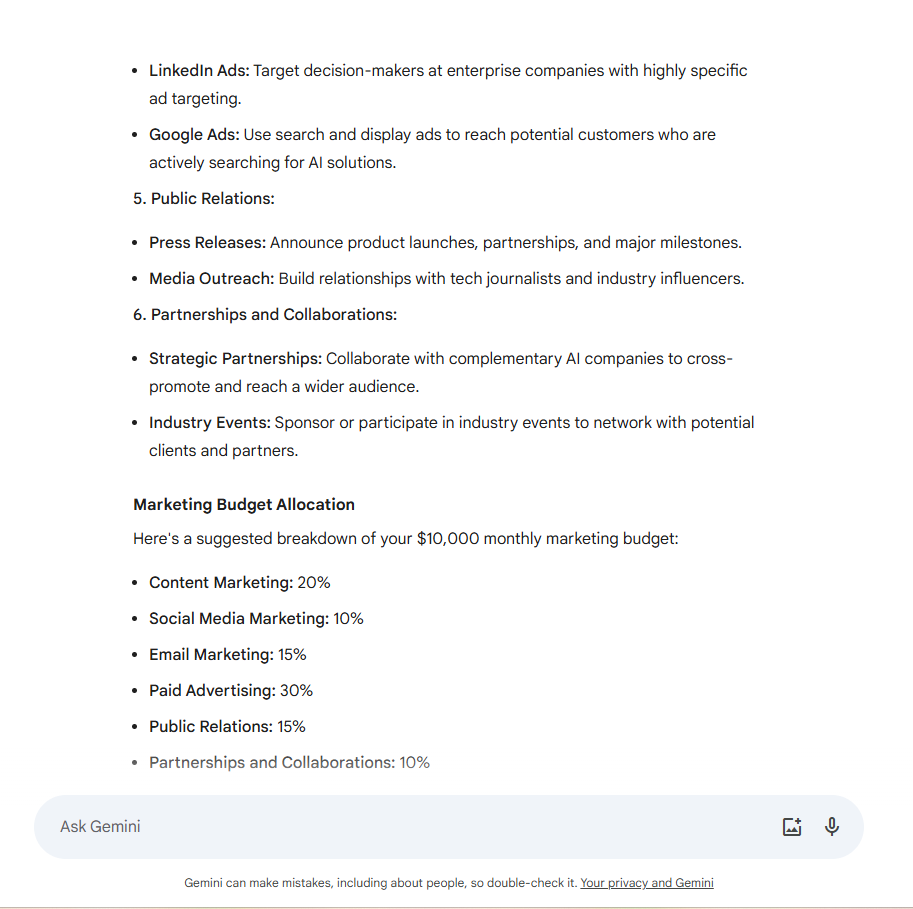
Gemini from Google is another platform to consider when building out your digital marketing strategy.
Unlike ChatGPT and Perplexity, Gemini recommended me to focus more on paid advertising and on public relations to grow faster in the beginning.
The platform then suggested we use LinkedIn Ads and Google Ads as my 2 main acquisition channels.
Interestingly, Gemini gave me bonus suggestions on how to position our product to our target audience, such as a cost-saver, and a productivity enhancer.
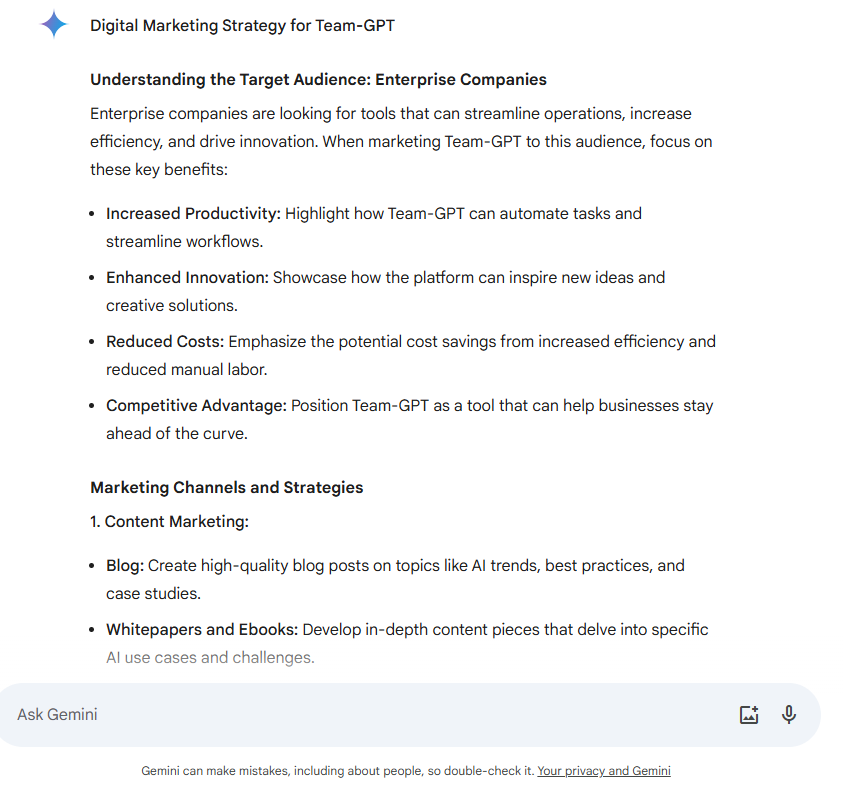
Adopt AI Alongside Your Team On Team-GPT
You can build your marketing strategy and then plan marketing campaigns by building a customized version of ChatGPT alongside your team on Team-GPT.
Our enterprise AI software lets your team generate content by utilizing various AI models like ChatGPT, DALL-E 3, Claude, and Perplexity.
Apart from that, you can access:
- A comprehensive pre-made prompt library to create efficient workflows.
- Detailed usage analytics to track employee engagement.
- Enterprise-grade security ensures data privacy and the ability to host the platform on your servers.

